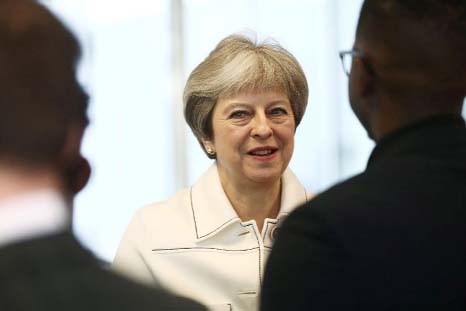
AFP :
British Prime Minister Theresa May and French President Emmanuel Macron on Monday faced anger from lawmakers for conducting air strikes with the United States in Syria in their first major military action since coming to power.
May was due to address MPs after proceeding with the joint strikes without prior parliamentary approval-a sensitive subject in Britain where memories of participation in the US-led invasion of Iraq in 2003 are still raw.
Jeremy Corbyn, leader of the main opposition Labour Party, has said the strikes were “legally questionable” and called for new legislation to stop governments launching military action without lawmakers’ backing in most circumstances.
“I believe that parliament should have been consulted and voted on the matter. The UK prime minister is accountable to parliament, not to the whims of a US president,” he wrote in a weekend letter to May.
Stop the War, a coalition once chaired by Corbyn, is holding a demonstration outside parliament later on Monday.
The group said the strikes “will have done nothing to end the war” and “risked dramatically widening” the conflict.
The leaders of the opposition Scottish National Party and Liberal Democrats have also criticised May and there is the possibility of a vote in parliament later Monday that could embarrass the prime minister if she loses.
In France, Macron has faced similar criticism for attacking Syria without consulting the legislature but defended the move as well as his constitutional powers in a TV interview on Sunday.
“This mandate is given democratically to the president by the people in the presidential election,” he said.
Macron also said he had convinced US President Donald Trump to stay engaged in Syria “for the long-term”.
Macron has been criticised from both right and left.
National Front leader Marine Le Pen has accused Macron of failing to show any evidence on the use of chemical weapons by the Syrian regime to justify the strikes.
Jean-Luc Melenchon, head of the hard-left France Unbowed party, has also condemned the strikes, while the leader of the centre-right Republicans party, Laurent Wauquiez, said he “did not believe in punitive strikes”.
But at a press conference in Paris on Monday, Macron said that France had acted with “international legitimacy”.
He argued the operation was legitimate despite not being sanctioned by the UN since under a 2013 UN resolution Syria was supposed to destroy its chemical weapons arsenal.
Ahead of May’s speech in parliament, Foreign Secretary Boris Johnson on Monday said the strikes were “right for the UK and right for the world” ahead of talks with EU foreign ministers.
“It was the world saying that we have had enough of the use of chemical weapons, the erosion of that taboo that has been in place for 100 years has gone too far under (Syrian President) Bashar al-Assad,” he said.
British Prime Minister Theresa May and French President Emmanuel Macron on Monday faced anger from lawmakers for conducting air strikes with the United States in Syria in their first major military action since coming to power.
May was due to address MPs after proceeding with the joint strikes without prior parliamentary approval-a sensitive subject in Britain where memories of participation in the US-led invasion of Iraq in 2003 are still raw.
Jeremy Corbyn, leader of the main opposition Labour Party, has said the strikes were “legally questionable” and called for new legislation to stop governments launching military action without lawmakers’ backing in most circumstances.
“I believe that parliament should have been consulted and voted on the matter. The UK prime minister is accountable to parliament, not to the whims of a US president,” he wrote in a weekend letter to May.
Stop the War, a coalition once chaired by Corbyn, is holding a demonstration outside parliament later on Monday.
The group said the strikes “will have done nothing to end the war” and “risked dramatically widening” the conflict.
The leaders of the opposition Scottish National Party and Liberal Democrats have also criticised May and there is the possibility of a vote in parliament later Monday that could embarrass the prime minister if she loses.
In France, Macron has faced similar criticism for attacking Syria without consulting the legislature but defended the move as well as his constitutional powers in a TV interview on Sunday.
“This mandate is given democratically to the president by the people in the presidential election,” he said.
Macron also said he had convinced US President Donald Trump to stay engaged in Syria “for the long-term”.
Macron has been criticised from both right and left.
National Front leader Marine Le Pen has accused Macron of failing to show any evidence on the use of chemical weapons by the Syrian regime to justify the strikes.
Jean-Luc Melenchon, head of the hard-left France Unbowed party, has also condemned the strikes, while the leader of the centre-right Republicans party, Laurent Wauquiez, said he “did not believe in punitive strikes”.
But at a press conference in Paris on Monday, Macron said that France had acted with “international legitimacy”.
He argued the operation was legitimate despite not being sanctioned by the UN since under a 2013 UN resolution Syria was supposed to destroy its chemical weapons arsenal.
Ahead of May’s speech in parliament, Foreign Secretary Boris Johnson on Monday said the strikes were “right for the UK and right for the world” ahead of talks with EU foreign ministers.
“It was the world saying that we have had enough of the use of chemical weapons, the erosion of that taboo that has been in place for 100 years has gone too far under (Syrian President) Bashar al-Assad,” he said.

